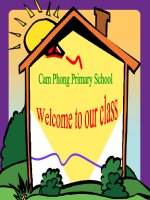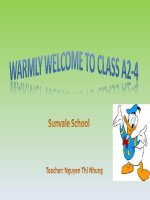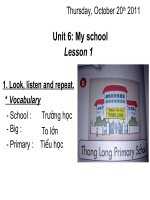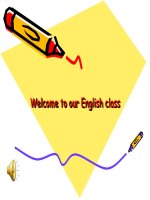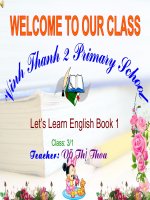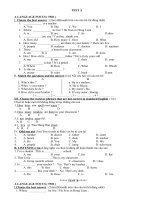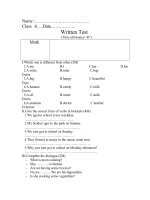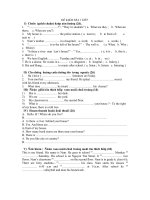unit 1 greetings tiếng anh 6 sách cũ nguyễn hoài đông thư viện giáo án điện tử
Bạn đang xem bản rút gọn của tài liệu. Xem và tải ngay bản đầy đủ của tài liệu tại đây (236.38 KB, 30 trang )
<span class='text_page_counter'>(1)</span><div class='page_container' data-page=1>
Week : 1
Period : 1
<b>INTRODUCTION</b>
<b>I/Mục tiêu:</b>
<i><b>1.Kiến thức:</b></i>
- Nắm được kiến thức cơ bản tối thiểu và tương đối hệ thống về Tiếng Anh thực hành
hịện đại phù hợp với lứa tuổi.
- Có sự hiểu biết ban đầu về văn hoá của một số nước sử dụng Tiếng Anh..
<i><b>2. Kỹ năng</b></i>:
- Kỹ năng nghe: Nghe hiểu Tiếng Anh sử dụng trong lớp học và hiểu các chủ điểm
giao tiếp bằng Tiếng Anh trong và ngoài lớp học .
- Kỹ năng nói: Thực hiện được các yêu cầu giao tiếp hàng ngày bằng Tiếng Anh, có
thể diễn đạt các nội dung giao tiếp đơn giản hàng ngày có liên quan đến các chủ điểm và nội
dung ngơn ngữ đã học trong chương trình.
- Kỹ năng đọc : đọc hiểu nộI dung chính của đoạn văn ngắn (150 từ ) đơn giản về các
chủ điểm đã học trong chương trình.
- Kỹ năng viết : Viết có hướng dẫn các đoạn văn về mô tả hoặc các báo cáo tường
thuật về các hoạt động của cá nhân hoặc lớp học trong khn khổ chủ điểm của chương
trình và viết phục vụ các nhu cầu giao tiếp cá nhân và xã hộI đơn giản..
<i><b>3. Thái độ tình cảm:</b></i>
- Có thái độ tình cảm đúng đắn đối với Đất nước, Con người, Nền văn hố và ngơn
ngữ đang học nhờ đó phát triển tình cảm tốt đẹp đối với ngơn ngữ và văn hố dân tộc.
<i><b>4. Năng lực:</b></i>
- Xây dựng và phát triển ý thức cũng như năng lực làm việc trong cộng đồng thông
qua các hoạt động rèn luyện ngôn ngữ.
- Bước đầu có nhu cầu và biết cách tự học để nắm và sử dụng tiếng nước ngoài trong
học tập và đời sống .
<b>II. Chuẩn bị:</b>
<b>1.Giáo viên: Sách giáo khoa, sách bài tập, đĩa nghe, …</b>
<b>2. Học sinh: Sách giáo khoa, sách bài tập, vở ghi, …</b>
<b>III/Tiến trình:</b>
<b>Hoạt động của giáo viên</b> <b>Hoạt động của học sinh</b>
<b>1.Khởi động: 8’</b>
<i>Mục tiêu: thu hút sự chú ý của học sinh và gây ấn</i>
<i>tượng tốt với các em về môn học và giáo viên</i>
<i>mới.</i>
-Hướng dẫn học sinh tham gia trò chơi “Thầy bảo
”
<b>2. Hoạt động 1: Giới thiệu bộ môn (15’)</b>
<i>Mục tiêu: giới thiệu nội dung môn học, cấu trúc</i>
<i>sách giáo khoa.</i>
-Giáo viên giới thiệu sơ lược về nội dung môn
học với những nội dung sau đây:
Chương trình mơn tiếng Anh cấp THCS nhằm
hình thành và phát triển cho học sinh những kiến
thức, kĩ năng cơ bản về Tiếng Anh và phẩm chất
trí tuệ cần thiết để tiếp tục học lên hoặc đi vào đời
sống lao động.
-Tham gia tập thể
</div>
<span class='text_page_counter'>(2)</span><div class='page_container' data-page=2>
Tiếng Anh 6 là cuốn sách thứ nhất trong
bộ sách bốn cuốn được biên soạn theo cùng quan
điểm đó là quan đỉểm chủ điểm
Sách Tiếng Anh 6 gồm 16 đơn vị, mỗi đơn
vị được thực hiện 5 hoặc 6 tiết. Mỗi đơn vị được
biên soạn theo một chủ điểm nhất định và chủ
đỉểm đó gần gũi, sát thực với mục đích, nhu cầu,
sở thích và đời sống hàng ngày của học sinh.
<i>Kết luận: nhắc lại tầm quan trọng của môn học</i>
<b>3.Hoạt động 2:Hướng dẫn cách học (15’)</b>
<i>Mục tiêu: giới thiệu các phương pháp học từ </i>
<i>vựng, mẫu câu.</i>
Qua phần giới thiệu khá chi tiết về môn học ,các
em cần nắm bắt một số chỉ dẫn về cách học dưới
dây:
+ Sách: Bao gồm sách giáo khoa Tiếng Anh
6 + sách bài tập Tiếng Anh 6.
(workbook)
+ Phương pháp học: Học theo “phương pháp
giao tiếp” theo trình tự “Nghe –Nói – Đọc –
Viết”. Cố gắng phát âm đúng âm điệu khi lặp lại .
Khi nói đồng thanh hoặc cá nhân thì ( nói to – tự
nhiên).
Nghe - Nói là hai kỹ năng chính. Các kỹ
năng khác sẽ được hướng dần dần để biết Đọc và
Viết
<i>Kết luận: nhấn mạnh tầm quan trọng của việc</i>
<i>phát âm đúng và rõ ràng.</i>
<b>4. Cũng cố, dặn dò: (7’)</b>
<i>Mục tiêu: điểm lại những nội dung chính về cấu</i>
<i>trúc sách và phương pháp học</i>
-Giáo viên tóm tắt lại nội dung buổi học, tiếp
nhận và trả lời ý kiến của học sinh
<i>Kết luận: nhắc nhở học sinh soạn bài mới.</i>
-Đặt câu hỏi (nếu có)
-Đặt câu hỏi (nếu có)
<b>Draw experience:</b>
...
...
...
Week : 1
Period : 2
</div>
<span class='text_page_counter'>(3)</span><div class='page_container' data-page=3>
<i><b>Section A - HELLO (1, 2, 3, 4)</b></i>
I/Objectives
<b>1/Knowledge, skill and attitude: </b>
- By the end of the lesson, students will be able to greet and get acquainted with one
another and Introduce their name.
- Focus on listening, speaking and writing skill.
- Teach Ss to polite with others
<b>2/ Competencies: Develop the cooperative competence.</b>
<b>II/Preperation </b>
-Teacher’s : teacher’s book, textbook, realia,…
- Students’: notebook, textbook,…
<b>III/ Procedures </b>
<i><b>Contents</b></i> <i><b>Teacher’s & students’ activities</b></i>
<b>1 . Warm up : 7’ </b>
<i>Aim: to get SS’ attention</i>
<b>Hello song</b>
Hello , hello, hello
Hello, I am Linda
Hello , hello, hello
Hello, I am Linda
<b>2/ Presentation: 20’</b>
<i>Aim: to teach new words and structures</i>
* New words:
- hi: (trans)
- hello: (trans)
- is/ am (v), (exp. )
- name (n)
* Structures:
I am.... = I’m + tên.
My name is....= My name’s + tên.
<i>Inference: to remind “I’m = My</i>
<i>name’s”</i>
<b> 3. Practice: 10’</b>
<i>Aim: to practice speaking the dialogue.</i>
I am Lan/ I am Nga
My name is Ba/ My name is Nam.
Ex1: Hoa: Hi, I am Hoa.
Nga: Hi, I am Nga.
Ex2: Hung: Hello, My name is Hung.
Nam: Hello, My name is Nam.
<i>Inference: to remind “’m = am; ‘s = is”</i>
4. Consolidation:8’
<i>Aim: to further practice speaking the</i>
<i>structures.</i>
* A4
Introduce SS the song and the content. Then
sing model.
SS: Listen and repeat.
Have some SS sing the song again. Then give
comment.
-T introduces vocabulary
* Note : “Hi” & “Hello” is used to greet in
friendly manner between friends, relatives.
T: read word by word
- Ss:- listen & repeat
- read in chorus
- read individual
- copy down
-Ask Ss to observe the dialogues in A3 then
give structures ( 2 ways to introduce one’s
name)
- Have Ss listen and repeat the sentences.
-T gives modal dialogues. Then T reads Ss
repeat.
-Ss role play reading the dialogues
</div>
<span class='text_page_counter'>(4)</span><div class='page_container' data-page=4>
I’m ( Ba ) / My name’s (Ba).
<i>Inference: to remind SS prepare next</i>
<i>lesson.</i>
<b>Draw experience:</b>
...
...
...
Week : 1
Period : 3
</div>
<span class='text_page_counter'>(5)</span><div class='page_container' data-page=5>
<b>1/Knowledge, skill and attitude: </b>
- By the end of the lesson, Ss will be able to use “How are you?” to greet each other.
- Focus on listening, speaking and writing skill.
- Teach Ss to be polite with others and respect the elder ones.
<b>2/ Competencies: Develop the cooperative competence.</b>
<b>II/Preperation </b>
-Teacher’s : teacher’s book, textbook, realia,…
- Students’: notebook, textbook,…
<b>III/ Procedures </b>
<i><b>Contents</b></i> <i><b>Teacher’s & students’ activities</b></i>
<b>1/ Warm up: 5’</b>
<i>Aim: to check SS’ background.</i>
* Jumbled words
- mena = name - llohe = hello
- ma = am - ym = my
<b>2/Presentation: 15’</b>
<i>Aim: to teach new words and structure.</i>
-fine (adj.): (trans)
-are (v) : (exp.)
-thanks = thank you: (exp.)
-Miss (exp.)/(realia)
-Mrs. (exp.)/realia)
-Mr. (exp.)/realia)
<b>STRUCTURES. Hỏi thăm sức khoẻ’</b>
How are you?
I’m fine, thank you. And you?
<i>Inference: to notice “ I’m fine = Fine”</i>
<b>3/ Practice: 15’</b>
<i>Aim: to practice speking the structures in </i>
<i>textbook.</i>
Ba: Hi, Lan
Lan: Hello, Ba
Ba: How are you?
Lan: I’m fine, thanks. And you?
Ba: Fine, thanks.
<i>Inference: to notice “thank you = </i>
<i>thanks”</i>
<b>4/ Consolidation: 10’</b>
<i>Aim: to further practice the structure</i>
Nam: Hello, <i><b>Lan</b></i>. How <i><b>are you</b></i>?
Lan: Hi. I’m <i><b>fine, thanks.</b></i>
<i>Inference: to remind SS prepare next</i>
<i>lesson.</i>
- Divide the class into two teams
- Ask Ss from each team to go to the
board and write down the correct
words.
- Explain some new words.
-Ss listen and guess the meaning.
.T: read word by word
- Ss:- listen & repeat
- read in chorus
- read individual
- copy down
-Have Ss look at the dialogue. Then
give structure.
-Ss look at the picture of Ạ5. Then
listen and repeat.
-Have Ss look at the pictures of A6 and
make similar dialogues
- Modal with one or two students
- Ss practice in pairs.
-Call on some pairs to present in front
of the class.
Give feedback
-Have Ss work in pair to complete A7.
Then call some pairs to present.
Give feedback.
</div>
<span class='text_page_counter'>(6)</span><div class='page_container' data-page=6>
<b>Draw experience:</b>
...
...
...
<i>Nguyễn Việt Khái, ngày …Tháng … Năm …</i> <i>Nguyễn Việt Khái, ngày …Tháng … Năm …</i>
<b>TỔ TRƯỞNG</b> <b>BAN GIÁM HIỆU</b>
Week : 2
Period : 4
<b>UNIT 1: GREETINGS</b>
<i><b> Section B - GOOD MORNING (B1, 2, 3, 4)</b></i>
<b>I/Objectives </b>
<b>1/Knowledge, skill and attitude: </b>
</div>
<span class='text_page_counter'>(7)</span><div class='page_container' data-page=7>
- Focus on listening, speaking and writing skill.
- Teach Ss to Teach Ss to be respect elder people.
<b>2/ Competencies: Develop the comunicative competence.</b>
<b>II/Preperation </b>
-Teacher’s : teacher’s book, textbook, realia,…
- Students’: notebook, textbook,…
<b>III/ Procedures </b>
<i><b>Contents</b></i> <i><b>Teacher’s & students’ activities</b></i>
<b>1/ Warm up : 8’</b>
<i>Aim: to check SS’ background.</i>
*Picture drill
Good morning
Good afternoon
Good evening
Good night
<b>2/ Presentation: 20’</b>
<i>Aim: to teach new words. </i>
<i><b>- good morning</b></i> (picture )
- <i><b>good afternoon</b></i> (picture)
- <i><b>good evening</b></i> (picture)
- <i><b>good night</b></i> (picture)
- <i><b>good bye</b></i> (picture)
- <i><b>we</b></i> (explanation) we are =
we’re
- you are = you’re. (explanation).
- <i><b> children</b></i> (realia ).
*Checking: R & R
- Presentation dialogue.
<i>Inference: to distinguish the phrases </i>
<i>with hi/hello.</i>
<b>3/ Practice:10’</b>
<i> Aim: to practice speaking and writing </i>
a. Pictures drill (B2).
Ex: S1 Good morning.
S2: Good morning.
b.Written practice. (B4/16)
Lan: Good afternoon ,Nga.
Nga: (1) ...
Lan: How are you?
Nga: (2)... .
(3)...?
Lan: Fine thanks.
Nga: Good bye.
Lan: (4)...
* Key: 1 Good afternoon, Nga.
-Ask Ss to say greeting when you meet
other people.
-Stick 4 pictures of B2 on the board.
- Have Ss guess the time in each
picture.
-Give feedback
- Present some new words by using
pictures or explanation.
- Read aloud
- Ss repeat
- Ss: read in chorus
read individually
- Read the dialogue of B3/15.
- Ss listen and repeat
-Let Ss role play reading the dialogue.
-Ask Ss to look at the pictures and
practice speaking in pairs
-Have SS look at the picture. Then
listen and repeat.
-Let Ss complete the dialogue of B4/16
into notebooks by writing.
-Call some pairs to read their dialogue.
-Correct & give answer key:
</div>
<span class='text_page_counter'>(8)</span><div class='page_container' data-page=8>
2 I’m fine thank you.
3 And you?
4 Bye/Good bye
<i>Inference: to remind SS the structures </i>
<i>with “How”. </i>
<b>4/ Consolidation: 7’</b>
<i>Aim: to further practice the usage of </i>
<i>the phrases. </i>
Good morning – good evening – good
afternoon – goodnight
Inference: to remind SS prepare next
<i>lesson. </i>
some tables.
- Read aloud
- Ss repeat
- Stick pictures of B1 on the board
again. Let Ss write the correct words
<b>Draw experience:</b>
...
...
...
Week : 2
Period : 5
<b>UNIT 1: GREETINGS</b>
<i><b>Section C: HOW OLD ARE YOU? (C1, 2)</b></i>
<b>I/Objectives </b>
<b>1/Knowledge, skill and attitude: </b>
- By the end of the lesson, Ss will be able to count from one to twenty.
- Focus on listening, speaking and writing skill.
- Teach Ss to learn studiously.
</div>
<span class='text_page_counter'>(9)</span><div class='page_container' data-page=9>
<b>II/Preperation </b>
-Teacher’s : teacher’s book, textbook, realia,…
- Students’: notebook, textbook,…
<b>III/ Procedures </b>
<b>Contents</b> <b>Teacher’s and Students’ activities</b>
<b>1/ Warm up : 7’ </b>
<i>Aim: to get SS’ attention and background.</i>
Number song
<b>2/Presentation: 20’</b>
<i>Aim: to teach SS numbers to twenty.</i>
Numbers frome one to twenty
<i>Inference: to distinguish “12-20; 5 – 15”</i>
<b>3/Practice: 10’</b>
<i>Aim: to practice count from 1-20</i>
Numbers frome one to twenty
<i><b>Eleven, twenty, fifteen, thirteen, twelve, </b></i>
<i><b>eight, seventeen, nineteen, four, sixteen.</b></i>
<i>Inference: to remind 12, 20, 11, 13</i>
<b>4. Consolidation: 8’</b>
<i>Aim: to recheck the numbers</i>
<b> jumpled words</b>
-levene = eleven -tenenine = nineteen
-Fevi = five - twynte = twenty
- theertin = thirteen - lvetwe = twelve
- seteenven = seventeen - gheit = eight
Inference: to remind SS prepare next
<i>lesson. </i>
Sing a song
-Introduce the numbers by using tables or
students in class to count
- Read aloud
- Ss:- listen & repeat
- read in chorus
- read individual
- copy down
- Have Ss count from one to twenty in pair.
Call some pair to present in front of the
class.
Give feedback.
-Show Ss some flash card and have them
speak aloud.
-Have Ss work in pair to do the jumpled
words
- Ask some pairs to show the result and give
feedback.
-Have Ss listen and repeat
<b>Draw experience:</b>
</div>
<span class='text_page_counter'>(10)</span><div class='page_container' data-page=10>
Week : 2
Period : 6
<b>UNIT 1: GREETINGS</b>
<i><b>Section C: HOW OLD ARE YOU? (C3, 4)</b></i>
<b>I/Objectives </b>
<b>1/Knowledge, skill and attitude: </b>
- By the end of the lesson, Ss will be able to ask and answer for the age
- Focus on listening, speaking and writing skill.
- Teach Ss to respect others.
<b>2/ Competencies: Develop the comunicative competence.</b>
<b>II/Preperation </b>
</div>
<span class='text_page_counter'>(11)</span><div class='page_container' data-page=11>
- Students’: notebook, textbook,…
<b>III/ Procedures </b>
<b>Contents</b> <b>Teacher’s and Students’ activities</b>
<b> 1/ Warm up : 8’ </b>
<i>Aim: to recheck SS’ background of numbers.</i>
Number song
<b>2/Presentation:15’</b>
<i>Aim: to teach new words and structure </i>
<i>about age.</i>
<b>a.New words</b>
- How old
- Year-old
<b>b. Structure:</b>
How old are you?
=> I’m eleven years old.
<i>Inference: to distinguish “ How old are </i>
<i>you ? – How are you?”</i>
<b>3/Practice:15’</b>
<i>Aim: to practice speaking structures.</i>
A: Hello, Miss Hoa. This is Lan.
B: Hello, Lan. How old are you?
C: I’m eleven
A: Hi, Ba. This is Phong.
B: Hi, Phong. How old are you?
C: I’m twelve.
No. Name Class Age
1
2
3
4
How old are you?
=> I’m <i><b>eleven</b></i> years old.
Inference: to remind the numbers.
<b>4. Consolidation: 7’</b>
<i>Aim: to recheck the structure</i>
How old are you?
=> I’m <i><b>eleven</b></i> years old.
Inference: to remind SS prepare next lesson.
Sing a song
-Have Ss look at the pictures C3. Give
setting.
- Introduce new words and structure
- Ss:- listen & repeat
- read in chorus
- read individual
- copy down
- Read modal the dialouges
- Ss: listen & repeat
- Have some Ss role play the dialouges.
Give feedback
- Have Ss to comple the table with the
structure.
-Call some Ss to show the table.
-Call some Ss to ask and answer about their
age.
Give feedback.
<b>Draw experience:</b>
</div>
<span class='text_page_counter'>(12)</span><div class='page_container' data-page=12>
<i>Nguyễn Việt Khái, ngày …Tháng … Năm …</i> <i>Nguyễn Việt Khái, ngày …Tháng … Năm …</i>
<b>TỔ TRƯỞNG</b> <b>BAN GIÁM HIỆU</b>
Week : 3
Period : 7
<b>UNIT 2: AT SCHOOL</b>
<i><b>Section: A - COME IN (A1,2 )</b></i>
<b>I/Objectives </b>
<b>1/Knowledge, skill and attitude: </b>
-By the end of the lesson, Ss will be able to use classroom imperative to understand
teacher’s commands.
- Focus on listening, speaking skill.
- Pay attention to the command of teacher and parents.
<b>2/ Competencies: Develop the communicative competence.</b>
<b>II/Preperation </b>
-Teacher’s : flash cards, pictures, realia,…
- Students’: notebook, textbook,…
</div>
<span class='text_page_counter'>(13)</span><div class='page_container' data-page=13>
<b>Teacher’s and Students’ activities</b>
- Introduce the rules of the game and how to play.
-Read new words aloud
- Ss repeat.
-Ss read individually.
- Read the text aloud
- Ss : Repeat
Read in Chorus
Read individual
-Ask Ss to look at the pictures /21 and match each
picture with the correct word or phrase word.
( work individually).
-Give answer key.
- Give the formation of imperative
-T mimes: (open your book, sit down, stand up,
come in, close your book)
-Guide Ss to play the game.
<b>-T: stand up. Ss don’t do</b>
-T: Simon says stand up. Ss do.
<b>Contents</b>
Game: Simon say ( Vietnamese)
Simon say:
- Đứng lên
- Ngồi xuống
- Giữ im lặng
- Lắc đầu
- Gật đầu
<b> a.</b> Pre teach vocabulary:
- come: (v) (pict. ).
-sit down >< stand up: (v) (action).
-book: (n) (realia).
-open your book: (act).
close your book: (act).
*Checking: Rub out and remember.
b.Presentation text: A 1/ 20.
.Matching.
a. Open your book.
b. Sit down.
c. Come in.
d. Close your book.
e. Stand up.
<b>*Structure: Imperative </b>
<b> From: V + O /A</b>
Ex: Open your book.
Mine Drill :
Students say:
+Open your book.
+Sit down.
-etc.
Simon says
<b>3/Practice .</b>
<b>Aim</b>
: To emphasize vocabularies and structures
<b>Inference</b>
: Place of “Please” and the ways to write.
<b>2/Presentation.</b>
<b>Aim</b>
: To teach Vocabularies and structures.
<b>Inference</b>
: polite communication with “please”
</div>
<span class='text_page_counter'>(14)</span><div class='page_container' data-page=14>
-Let Ss make the dialogue by using the mapped
dialogue
*Put the correct word in the brackets.
a. ...down, please.
b. Please ...your book.
c. ...notebook, please.
d. ...up, please.
e. Please ...in
<b>Draw experience:</b>
...
...
...
Week : 3
Period : 8
UNIT 2: AT SCHOOL
<i><b>Section B - WHERE DO YOU LIVE ?(1, 3)</b></i>
<b>I/Objectives </b>
<b>1/Knowledge, skill and attitude: </b>
-By the end of this period, the students will be able to questions and answers to talk
about the places they live and say the alphabet.
- Focus on listening, speaking skill.
- Ask and answer politely with other people.
<b>2/ Competencies: Develop the communicative competence.</b>
<b>II/Preperation </b>
-Teacher’s : teacher’s book, textbook, realia,…
- Students’: notebook, textbook,…
<b>III/ Procedures </b>
<b>Teacher’s &students’ activities</b> <b>Content</b>
<b>4/ Production:</b>
<b>Aim</b>
: To recheck the Vocabularies and structures
</div>
<span class='text_page_counter'>(15)</span><div class='page_container' data-page=15>
- Have Ss play game “ Hang man “ with
words : sit down , stand up, open your
book, …
-Have Ss look at the picture. Ask them
what it talks about.
- Introduce some new words
Ex: We live in Viet Nam
Ex: We live in Buon Ma Thuot City.
- Read new words alouds
- Ss: - Repeat in chorus
- Read individual
- Copy in their notebooks
- Read the dialogue aloud
- Ss:- Listen and Repeat
- Play the role to practice
- Introduce the new structures
- Model 2 cues , the whole class repeats,
then ask some students to repeat
individually
- Make sure the students remember the
exchange, then ask a new student / give a
new cue.
- Let all students work in pairs, one asks ,
the other answers
-Introduce the English alphabet.
-Introduce Ss to sing a song.
* Hang man
1. (to) live (example)
2. a house (picture / draw)
3. a street ( picture )
4. a city (example)
5. What (trans. )
6. Where(trans.)
7. How(trans.)
* Check Vo. What & Where
2. Presentation Dialogue
( B1 – P.23)
* Model sentences:
A: Where do you live?
B: I live on Tran Phu Street.
in a house/ a city/ Vietnam
* Word cue drill
a house <b>a city</b> BMT
City
Le Duan
Street
<b>Le Loi </b>
<b>street</b>
Hue
Example Exchange:
S1: Where do you live?
S2 : I live on Le Loi Street
<b>ABC song</b>
<b>4/ </b>
<b> Production</b>
<b> : </b>
<b>Aim</b>
: To recheck Vocabularies , structures and English alphabet
<b>Inference</b>
: To distinguish “in, on, at” and some letters
<b>3/ </b>
<b> </b>
<b>Practice</b>
<b>: </b><b>Aim</b>
: To To emphasize Vocabularies, structures and introduce English alphabet
<b>Inference</b>
: Distinguish “h, s, f, z”
<b>2/ </b>
<b> Presentation</b>
<b> : </b>
<b>Aim</b>
: To introduce Vocabularies and structures
<b>Inference</b>
: To notice the usage of “in, on, at”
<b>1/ </b>
<b> Warm up</b>
<b> : </b>
</div>
<span class='text_page_counter'>(16)</span><div class='page_container' data-page=16>
- Have each student asks and fills in
information about three others
-Resing the song
<b>D. Production</b>
* Survey
Name Street City
ABC Songs
Draw experience:
...
...
...
Week : 3
Period : 9
UNIT 2: AT SCHOOL
<i><b> Section B - WHERE DO YOU LIVE? (4,5)</b></i>
<b>I/Objectives </b>
<b>1/Knowledge, skill and attitude: </b>
- By the end of this period, the students will be able to spell their name.
- Focus on listening, speaking and writing skill.
- Ask and answer politely with other people.
<b>2/ Competencies: Develop the presentation competence.</b>
<b>II/Preperation </b>
-Teacher’s : teacher’s book, textbook, realia,…
- Students’: notebook, textbook,…
</div>
<span class='text_page_counter'>(17)</span><div class='page_container' data-page=17>
<b>Teacher’s &students’ activities</b> <b>Content</b>
- Sing a song
- Ss: listen and sing
- Introduce new words
Turn on the tape ( 3 times ) –B 3
- Ss listen & repeat.
- Read individual
T: correct the mistakes.
- Have Ss play game
- Read the dialogue aloud
- Ss:- Listen and Repeat
- Introduce the new structures
-Explain the way to use questions:
- Note the way to read “spell-it” and
What’s_ your ... .
- Have Ss play the role to practice
- Model 2 cues , the whole class repeats,
then ask some students to repeat
individually
- Make sure the students remember the
exchange, then ask a new student / give a
new cue.
- Divide the class into 2 teams; introduce Ss
how to play and the rules.
- Write 10 numbers on the board ,
* Sing “ The A, B, C” song
1, Pre- teach
(to) spell ( trans. )
a, b, c, d, e, f, g, h, I, j, k, l, m, n
o, p, k, r, s, t, u, v, w, x, y, z
* Check Vo. Shark attack
Presentation Dialogue
( B4 – P.25)
* Model sentences:
A: What’s you name?
B: My name’s Lan
A: How do you spell it?
B: L – A – N , Lan.
Minh – Nga – Hue
Ngan – Huynh – Lam
Example Exchange:
S1: What’s you name?
S2 : My name ‘s Minh
S1: How do you spell it ?
S2 : M-I-N-H, Minh.
*Lucky number
<b>1 2 3 4 5</b>
6 7 8 9 10
2. What’s your name?
4. Where do you live?
6. How do you spell your name?
8. How old are you ?
10. Spell from A to Z
<b>Draw experience:</b>
...
...
...
<b>1/ </b>
<b> Warm up</b>
<b> : </b>
<b>2/ </b>
<b> Presentation</b>
<b> : </b>
<b>Aim</b>
: To introduce Vocabularies , structures and English alphabet
<b>Inference</b>
: To spell correctly
<b>3/ </b>
<b> Practice</b>
<b> : </b>
<b>Aim</b>
: To introduce Vocabularies , structures and English alphabet
<b>Inference</b>
: To spell correctly
<b>4/ </b>
<b> Production</b>
<b> : </b>
<b>Aim</b>
: To introduce Vocabularies , structures and English alphabet
</div>
<span class='text_page_counter'>(18)</span><div class='page_container' data-page=18>
<i>Nguyễn Việt Khái, ngày … Tháng … Năm … Nguyễn Việt Khái, ngày … Tháng … Năm ..</i>
<b>TỔ TRƯỞNG</b> <b>BAN GIÁM HIỆU</b>
Week : 4
Period : 10
UNIT 2: AT SCHOOL
<i><b>Lesson 5 - Section C - MY SCHOOL ( 1 ) </b></i>
<b>I/Objectives </b>
<b>1/Knowledge, skill and attitude: </b>
-By the end of this period, the students will be able to learn how to say what things
are and use This /That positive statements and Y/N questions to talk about people and things
at school.
- Focus on listening, speaking and writing skill.
- Ask and answer politely with other people.
<b>2/ Competencies: Develop the communication competence.</b>
<b>II/Preperation </b>
-Teacher’s : teacher’s book, textbook, realia,…
- Students’: notebook, textbook,…
<b>III/ Procedures </b>
</div>
<span class='text_page_counter'>(19)</span><div class='page_container' data-page=19>
- Give the ball for the first student (S1)
S1 says A – B – C ,then gives the ball for
S2 . S2 says D , then gives S3 , . . . The
student who says Z , will win the game and
get 1 mark , and then continues to say A –
B, ……….
Note: Each student can say 1,2 or 3 letters
- Show the picture to talk about subject “
School”
- Introduce new words
- Read new words aloud s
- Ss: - Repeat
- Read in chorus
- Read individual
- Ask Ss practice vocabulary and revise “
How do you spell it?”
- Read the dialogue aloud
- Ss:- Listen
- Repeat
- Introduce the new structures
-Explain the different between “ this and
that”.
- Read the dialogue aloud
- Ss: Listen
- Show the pictures from P. 26 to 27
- Have Ss play the role to practice
- Model 2 cues, the who le class repeats,
then ask some students to repeat
individually
- Make sure the students remember the
exchange, then ask a new student / give a
new cue.
* First to say Z !
1, Pre- teach
1. a student (realia)
2. a teacher (realia)
3. a class (realia)
4. a classroom (realia)
5. a desk (realia)
* Check Vo: Word cue drill
Ex: T: write on the board:
S1: What is this in English?
S2 : ( a student)
S1: How do you spell it?
S2: ( S –T – U – D – E - N – T )
2. Presentation
( C1 – P.27-27)
* Model sentences:
This is my desk.
That’s school.
Is this your class?
that teacher? – Yes,it is
- No , it isn’t
* Picture drill
*Example Exchange:
S1: Is this your ( school)?
S2 : No, it isn’t
<b>D. Production</b>
<b>Aim</b>
: To recheck Vocabularies , structures
<b>Inference</b>
: To notice “this-is”
<b>C. Practice</b>
<b>Aim</b>
: To emphasize Vocabularies , structures
<b>Inference</b>
: To notice “this-is”
<b>B. Presentation</b>
<b>Aim</b>
: To introduce Vocabularies , structures
<b>Inference</b>
: To notice pronounciation
<b>A. Warm up </b>
.
</div>
<span class='text_page_counter'>(20)</span><div class='page_container' data-page=20>
- Let all students work in pairs, one asks,
the other answers
- Point to real things in and around the
classroom.
Ss: Work in open-pairs
*Example Exchange:
S1:Is this your ( school)?
S2 : Yes, it is
<b>Draw experience:</b>
...
...
...
Week : 4
Period : 11
UNIT 2: AT SCHOOL
<i><b>Lesson 5 - Section C - MY SCHOOL ( 2, 3 ) </b></i>
<b>I/Objectives </b>
<b>1/Knowledge, skill and attitude: </b>
- By the end of this period, the students will be able to learn how to use “What’s
this / that?” “It’s a/an …………” to talk about things in the classroom.
- Focus on listening, speaking and writing skill.
- Ask and answer politely with other people.
<b>2/ Competencies: Develop the communication competence.</b>
<b>II/Preperation </b>
-Teacher’s : teacher’s book, textbook, realia,…
- Students’: notebook, textbook,…
<b>III/ Procedures </b>
<b>Teacher’s &students’ activities</b> <b>Content</b>
- Divide the class into 2 groups * Chain game
<b>A. Warm up </b>
.
</div>
<span class='text_page_counter'>(21)</span><div class='page_container' data-page=21>
T: says the first sentence
Group 1 : Say the second sentence
Group 2 : Say the second sentence
Group 1: ………
The group which says more sentences will
win the game.
T: Use this dialogue to elicit and practice
spelling vocabulary
- Show the picture to show the new words,(
Using the same as dialogue buid)
- Read new words aloud s
- Ss: - Repeat
- Read in chorus
- Read individual
- Show the picture and ask
Ss: Answer
- Explain the way to use these structures
- Give examples
- Show real things in class and model a
sentence
- Have Ss practice in pairs
- Call some pairs to present in front of the
class.
- Stick the poster on the board
- Ask Ss to find 10 words about things in
class in the word square
- Get Ss to work in pairs to find the words
- Divide the class into 2 teams, Ss from
each team go to the board and circle the
words they have found then write them
down the column of their team
-The team which has more words will win
T: I’m a student.
S1 : I’m a student. I’m twelve years old.
S2 : I’m a student. I’m twelve years old.
I’m (Lan). . . .
* Dialogue build
Class: What is this?
Teacher : It’s a door.
Class: How do you spell it?
Teacher: D – O – O – R
* Picture drill to Pre- teach Vocabulary.
( C2 – P. 28 )
a door , a window , a board , a clock ,
a waste basket , a school bag, a pencil,
a pen , a ruler , an eraser
* Check Vo : What and where
* Model sentences:
T: What is this ?
Ss : It’s a door
=> What is this/ that?
It’s + a/an + …..
1 Speaking :
2. Wordsquare
W P E N S C E X
O E D D C L R D
D N E O H O A R
N C S O O C S A
I I K R O K E O
W L R U L E R B
Answer: ˆˆ pen(s) , ruler
window , board
pencil, pen, desk, door, school,
clock, eraser.
* Lucky numbers
1 2 3 4 5
6 7 8 9 10
<b>B. Presentation</b>
<b>Aim</b>
: To introduce Vocabularies , structures
<b>Inference</b>
: To notice the way to answer the structure.
<b>C. Practice</b>
<b>Aim</b>
: To emphasize Vocabularies , structures
<b>Inference</b>
: To notice “It’s-a/an …”
<b>D. Production</b>
<b>Aim</b>
: To recheck Vocabularies , structures
</div>
<span class='text_page_counter'>(22)</span><div class='page_container' data-page=22>
the game.
- Divide the class into 2 teams.
- Write 10 numbers on the board , give
them the game’s instruction.
3,7,9 are lucky numbers
1. How do you spell ‘DESK’?
2. How do you spell ‘CLASSROOM’?
4. How do you spell ‘CLOCK’?
5. How do you spell ‘PENCIL’?
6. How do you spell ‘RULER’?
8. How do you spell ‘ERASER’?
10. How do you spell ‘WINDOW’?
<b>Draw experience:</b>
...
...
...
Week : 4
Period : 12
UNIT 3: AT HOME
<i><b>Lesson 1- Section A : MY HOUSE (1,2)</b></i>
<b>I/Objectives </b>
<b>1/Knowledge, skill and attitude: </b>
- By the end of the lesson, teacher help students to say what things are, ask and
answer about things in the house.
- Focus on listening, speaking and writing skill.
- Protect things at home at at school.
<b>2/ Competencies: Develop the communication competence.</b>
<b>II/Preperation </b>
-Teacher’s : teacher’s book, textbook, realia,…
- Students’: notebook, textbook,…
<b>III/ Procedures </b>
<b> </b>
<b>Teacher and sts’ activities</b> <b>Contents</b>
T : show something in class and ask <b>Questions : </b><i><b>What is that / this ?</b></i>
<b>A.Warm up :</b>
</div>
<span class='text_page_counter'>(23)</span><div class='page_container' data-page=23>
Sts : look at and answer
- Use pictures to present new words
- Read the new words.
Ss:- listen & repeat
- read in chorus
- read individual
- Play the tape again and let Ss repeat
Ss : - Repeat after teacher .
<b>-</b> Listen and copy down.
<b>-</b> Repeat (chorus) ,then work in pairs.
T : explain new structures, how to use the
plural form of verb “ be “ and “ noun “ to
practice the plural from
Ss : copy down
- practice in pairs to ask and answer
about things in the pictures
T :asks Ss to practice asking and
answering the questions about things in
the picture
Sts : practice in pairs
T: reminds Ss the way to ask about things
Sts : ask and answer.
<b>-</b> It’s a window.
<b>-</b> It’s a pen.
<b>-</b> It’s a ruler.
<b></b>
<i><b>-1. Listen and repeat :</b></i>
<b>{ Vocabulary :</b>
- living-room ( n ) - telephone ( n )
- lamp ( n ) - bookshelf ( n )
- armchair ( n ) - couch ( n )
- table ( n ) - television ( n )
- stereo ( n ) - chair ( n )
- stool ( n )
* Check Vo: Rub out and remember
<b>{ Structure :</b>
<b>* What is this / that ? – It’s a / an……</b>
is <sub></sub> are
this <sub></sub> these
that <sub></sub> those
it <sub></sub> they
<b>* What are these / those ?</b>
<b>They are + plural noun</b>
Ex : What are these ?
They are stools
What are those ?
They are armchairs
<i><b>2. Practice with a partner :</b></i>
a. What are these ?
They are stools .
b. What is this ?
It’s a table
c. What is that ?
It’s a clock.
<b>Draw experience:</b>
...
...
...
<b>B .Presentation</b>
<b>Aim</b>
: To introduce Vocabularies , structures
<b>Inference</b>
: To notice compound nouns
<b>C. Practice :</b>
<b>Aim</b>
: To emphasize Vocabularies , structures
<b>Inference</b>
: To distinguish the answer for singular and plural questions.
<b>D. Production</b>
<b>Aim</b>
: To recheck Vocabularies , structures
</div>
<span class='text_page_counter'>(24)</span><div class='page_container' data-page=24>
<i>Nguyễn Việt Khái, ngày … Tháng … Năm … Nguyễn Việt Khái, ngày … Tháng … Năm …</i>
<b>TỔ TRƯỞNG</b> <b>BAN GIÁM HIỆU</b>
Week : 5
Period : 13
UNIT 3: AT HOME
<i><b>Lesson 2- Section A : MY HOUSE (3,4,5)</b></i>
<b>I/Objectives </b>
<b>1/Knowledge, skill and attitude: </b>
- By the end of the lesson, students will be able to talk about the relationship in the
family
- Focus on listening, speaking and writing skill.
- Respect older people
<b>2/ Competencies: Develop the solving competence.</b>
<b>II/Preperation </b>
-Teacher’s : teacher’s book, textbook, realia,…
- Students’: notebook, textbook,…
<b>III/ Procedures </b>
<b>Teacher and sts’ activities</b> <b>Contents</b>
T :Use method “ Noughts and
crosses”
Sts : do as directed
<b></b>
<b></b> <b></b> <b></b>
<b>A. Warm up (7’) :</b>
<b>Aim</b>
: To make Ss happy with new lesson.
<b>B. Presentation (18’)</b>
<b> :</b>
<b>Aim</b>
: To introduce Vocabularies , structures
</div>
<span class='text_page_counter'>(25)</span><div class='page_container' data-page=25>
T: use pictures of family and tell them
about the relationship in a family and
then present new words
<b>-</b> read the new words.
Ss : - Repeat after teacher
<b>-</b> Listen and copy down.
<b>-</b> Read individual
-Play the tape again and let Ss repeat
<b>-</b> Repeat (chorus) then work in
pairs.
T: give some possessive adjectives
Ss : listen and copy down
T : explain the questions to ask Who
this is / How many people….
Sts : copy down
T :ask Ss to practice asking and
answering the questions about name,
people, age
Sts : practice in pairs
Have Ss answer the question about
themselves.
<b> Vocabulary :</b>
<b>-</b> family ( n) - father ( n )
<b>-</b> mother ( n ) - brother ( n )
<b>-</b> sister ( n ) - people ( n )
<b>-</b> she ( pron ) - he ( pron. )
<b>-</b> his - her
<b>Possessive adjectives : </b>
I <sub></sub> my
He <sub></sub> his
She <sub></sub> her
You <sub></sub> your
E.g : My book ; his name ; her ruler
<b> Structure :</b>
<b>1.Who is that ? / Who is that ?</b>
<b>That’ s / this is ……… It’s + name </b>
Ex : Who is this ?
This is Hoa
<i><b>2. </b></i><b>How many people are there in your family?</b>
<b>There are + number + people</b>
Ex : How many people are there in your family ? -
There are five people.
<i><b>3.</b></i><b>S + to be + noun ( ngheà )</b>
Ex : She is a teacher.
<b>* Answer the questions (A4) :</b>
a. Her name is Nga
b. His name is Ha
c. That is Ba. He is twelve.
d. This is Lan. She is fifteen.
<b>Answer the questions. (A4)</b>
<b>a.</b> Her name’s Nga.
<b>b.</b> His name’s Ha.
<b>c.</b> He’s Ba. He’s twelve years old.
<b>d.</b> She’ Lan. She’s fifteen years old.
<b>Answer the questions. (A5)</b>
<b>Draw experience:</b>
...
...
...
<b>C. Practice (15):</b>
<b>Aim</b>
: To check Vocabularies , structures
<b>Inference</b>
: To notice short form of TOBE
D
<b>. Consolidation ( 5’)</b>
:
<b>Aim</b>
: To recheck Vocabularies , structures
</div>
<span class='text_page_counter'>(26)</span><div class='page_container' data-page=26>
Week : 5 Date of preparation: September 15th
Period : 14 Date of teaching :
UNIT 3: AT HOME
<i><b>Lesson 3- Section B : NUMBERS(1,2,3,4,5 )</b></i>
<b>I/Objectives </b>
<b>1/Knowledge, skill and attitude: </b>
- By the end of the lesson, students will be able to ask about quantity of things and
how to use singular nouns and plural nouns
- Focus on listening, speaking and writing skill.
- Respect older people
<b>2/ Competencies: Develop the solving competence.</b>
<b>II/Preperation </b>
-Teacher’s : teacher’s book, textbook, realia,…
- Students’: notebook, textbook,…
<b>III/ Procedures </b>
<b>Teacher and sts’ activities</b> <b>Contents</b>
T : Let Ss play “ Bingo “ with
cardinal numbers from 1-20
Sts : play as the direction
T: Introduce the cardinal numbers
from one to one hundred.
<b>2</b> <b>5</b> <b>7</b> <b>9</b> <b>13</b>
<b>4</b> <b>6</b> <b>8</b> <b>10</b> <b>14</b>
<b>15</b> <b>16</b> <b>17</b> <b>18</b> <b>19</b>
<i><b>1. Listen and repeat the numbers: </b></i>
<b> Vocabulary :</b>
<b>A.Warm up (8’)</b>
<b> :</b>
<b>Aim</b>
: To recheck ordinal numbers.
<b>B. Presentation (17’)</b>
<b> :</b>
<b>Aim</b>
: To introduce Vocabularies , structures
</div>
<span class='text_page_counter'>(27)</span><div class='page_container' data-page=27>
- Mention the difference between
1-10 and 1-10 – 20 and the main stressed
syllables of the numbers.
T: let Ss listen to the cassette, repeat
and count by themselves.
Ss: do as directed.
T : explain how to form the plural
nouns
Ss: listen and copy down
T: show the picture and let Ss count
things in it .
Sts : count
- Remind the question with How
many
Ss : listen and copy down
-Have Ss lidten and repeat. Then
practice with the partner.
-Have Ss count the items in the
picture. Then write the number.
-T calls some Ss to give the answer
and have feedback.
T: give some single nouns and get Ss
to change into plural nouns
Ss : do their task
<b>-</b> 30 thirty - 40 forty
<b>-</b> 50 fifty - 60 sixty
<b>-</b> 70 seventy - 80 eighty
<b>-</b> 90 ninety - 100 one hundred
<b> Structure : </b>
Ex : a door <sub></sub> doors a chair <sub></sub> two chairs
Ex : a bench <sub></sub> benches a couch <sub></sub> six couches
Ex : a shelf <sub></sub> three shelves
Ex : a family <sub></sub> families
1 door 1 table
2 students 1 board
2 books 1 erase
1 window 1 chair
1 check 5 desks
1 ruler 2 benches
<b> Structure : </b>
<b>How many ………..…. are there ?</b>
<b>There are ………..</b>
<b>There is one. </b>
A3 + A4
A5
Bus <sub></sub> buses
Leaf <sub></sub> leaves
Dish <sub></sub> dishes
Stool <sub></sub> stools
<b>Draw experience:</b>
...
...
...
<b>C. Practice (15’) :</b>
<b>Aim</b>
: To introduce Vocabularies , structures
<b>Inference</b>
: To notice “There is/ There are”
<b>D. Consolidation (5’) :</b>
<b>Aim</b>
: To introduce Vocabularies , structures
</div>
<span class='text_page_counter'>(28)</span><div class='page_container' data-page=28>
Week : 5 Date of preparation: September 15th
Period : 15 Date of teaching :
UNIT 3: AT HOME
<i><b>Lesson 4- Section C : FAMILIES( 1 )</b></i>
<b>I/Objectives </b>
<b>1/Knowledge, skill and attitude: </b>
- By the end of the lesson, students will be able to tell about their families members
of their families and their occupation
- Focus on listening, speaking and writing skill.
- Respect others’ occupation
<b>2/ Competencies: Develop the communicative competence.</b>
<b>II/Preperation </b>
-Teacher’s : teacher’s book, textbook, realia,…
- Students’: notebook, textbook,…
<b>III/ Procedures </b>
<b>Teacher and sts’ activities</b> <b>Contents</b>
- Gets Ss to make sentences by the
word given
Ss : make sentences
- Introduce the situation of the text
and give guiding questions then let Ss
* Writing
1. many / students / How / there / are ?
Are / There / forty-five
2. many / desks / How / are / there ?
Eight / there / are
<b>* Questions :</b>
1. How many people are there in this family?
<b>A.Warm up (8’)</b>
<b> :</b>
<b>Aim</b>
: To recheck last lesson
<b>B. Presentation (17’)</b>
<b> :</b>
<b>Aim</b>
: To introduce Vocabularies , structures
</div>
<span class='text_page_counter'>(29)</span><div class='page_container' data-page=29>
to listen to the tape.
Ss : listen
- Play the tape again and let Ss to
repeat after the tape.
Ss : listen and repeat
T: give meaning of the word and the
question
Ss : listen and copy
- Ask Ss to ask and answer the
questions
Ss : practice ( pair work )
After asking and answering, T gives
the correct answers.
Ss : check and copy down
-Have Ss answer the question.
Give feedback then.
2. How old is his mother ?
<b> Vocabulary : </b>
<b>-</b> engineer ( picture) : -doctor (picture)
<b>-</b> nurse ( picture)
<b> Structure : </b>
<b>What does he do ? – He is a/an + Noun</b>
Ex : what does he do ? – He is an engineer.
<b>Where + be + S ? – S + be + place</b>
Ex : Where is he ? – He is in the living room
<b>* Answer :</b>
a. There are four people.
b. He is forty.
c. He is an engineer.
d. She is thirty-five
e. She is a teacher.
f. Her brother is eight.
g. He is a student.
h. They are in the living-room
How many people are there in your family?
How old is your father?
What does he do?
<b>Draw experience:</b>
...
...
...
<i>Nguyễn Việt Khái, ngày … Tháng … Năm … Nguyễn Việt Khái, ngày … Tháng … Năm …</i>
<b>TỔ TRƯỞNG</b> <b>BAN GIÁM HIỆU</b>
<b>C. Practice :(17’)</b>
<b> :</b>
<b>Aim</b>
: To check Vocabularies , structures
<b>Inference</b>
: To notice the replacement of pronoun.
<b>D. Consolidation (17’)</b>
<b> :</b>
<b>Aim</b>
: To introduce Vocabularies , structures
</div>
<span class='text_page_counter'>(30)</span><div class='page_container' data-page=30></div>
<!--links-->


